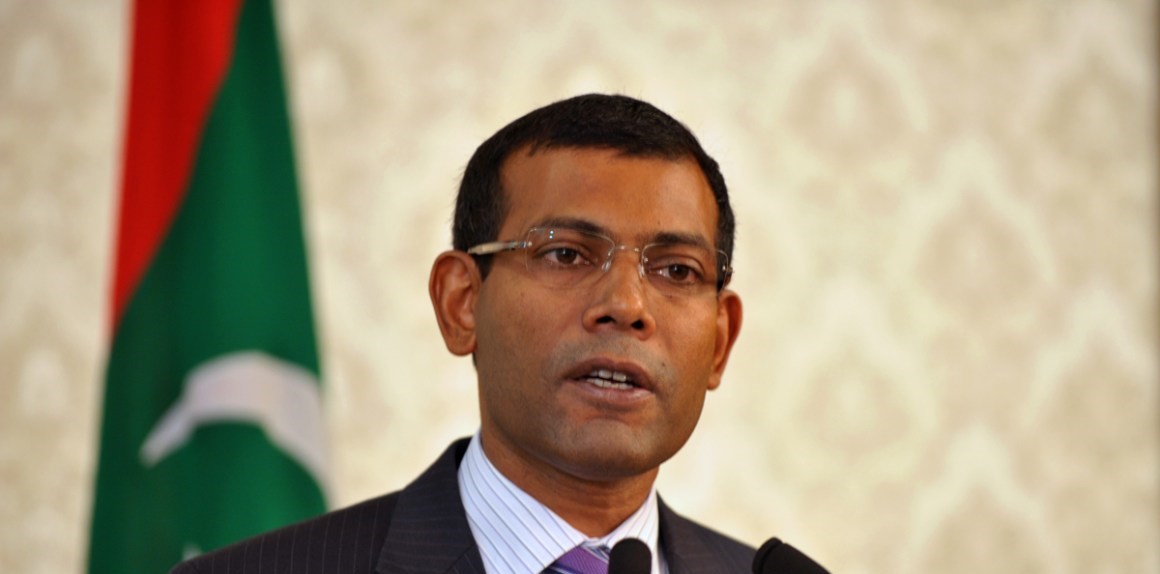Maldives - Trouble in Paradise
February 20, 2018 | Expert Insights

Mohamed Nasheed, the former President of the Maldives currently in exile, painted a grim picture of his home country during a conference in India. He spoke about radical Islam, ISIS and the current political crisis gripping the tiny state. He also expressed his concern over China and called on for intervention from India. He was speaking at The Huddle, a conference organized by The Hindu group.
Is the Indian ocean at the precipice of a Cold War?
Background
The Maldives is an Islamic republic which lies off the Indian sub-continent. It is made up of a chain of nearly 1,200 islands, most of them uninhabited. Only 198 of the islands part of Maldives have human habitation. It lies southwest of Sri Lanka and India. The chain of 26 atolls stretches from Ihavandhippolhu Atoll in the north to the Addu City in the south.
The tiny region can be described as a mixed economy which is based on the principal activities of tourism, fishing and shipping. Development of infrastructure in the Maldives is mainly dependent on the tourism industry and its complementary tertiary sectors, transport, distribution, real estate, construction, and government. Taxes on the tourist industry have been plowed into infrastructure and it is used to improve technology in the agricultural sector.
The region is presently locked in a political crisis. In 2018, in a surprising ruling, a court in the Maldives threw out the "terrorism" conviction against the island nation's former President Mohamed Nasheed. He was the nation’s first democratically elected President in the nation. The court also ordered the release of several other jailed politicians.
The current administration refused to comply and on Sunday (4th February) issued a statement that they would also resist any effort by the Supreme Court to impeach the President. The government also called on a state of emergency for the region and arrested judges from the Supreme Court as a result. India and China are in the middle of the crisis as the opposition has called on India to conduct a military intervention.
Analysis
Mohamed Nasheed, the former President of the Maldives currently in exile, was in India over the weekend to attend the The Huddle, a conference organized by The Hindu. He spoke on a wide-ranging subject affecting Maldives including the current political crisis and radical Islam.
Nasheed said that the ISIS network is especially strong in Maldives and the narrowest version of Islam is now embedded in nearly every system. He also noted that a large contingent of people from Maldives go to join ISIS and this has to be addressed. “ISIS are quietly maneuvering themselves into key positions within the security forces, judiciary, various government agencies and the street gangs in the Maldives. This systematic embedding into the political, bureaucratic and social fabric of the country means they are close to effectively running a parallel shadow state, the deep ISIS state in the Maldives,” he noted.
He also urged India to act aggressively to mediate the crisis in Maldives. He said that he wasn’t even looking for a military intervention. He noted, “We are in a defining moment in the Indian Ocean. If we go into an election in 2018 with no other candidates, President Yameen will win. Then we will have at least 10 years of autocratic rule. After that India or anyone else in the world will not be able to pull us out of that situation. If nothing is done today, you would lose the moment.”
One key problem that he highlighted that is currently plaguing Maldives is the issue of land grabbing. He said, “A far more sophisticated attack on the Maldives is happening without a single shot being fired. Although land grabs are occurring worldwide, they are more common in countries where the protection of human rights is poor. Due to a combination of international and domestic drivers, the Maldives has become a flourishing land grab paradise.”
He said that given 70% of Maldives’ international debt was held by the Chinese, this was an additional cause of concern adding, “When countries can’t pay back the debt, they ask for equity and we end up relinquishing sovereignty. Without firing a single shot, China has grabbed more land than what the East India company had, at the height of the colonial era. They have weaponized foreign direct investments.”
The former President’s outlook of the region overall was not optimistic. He made it clear that the Indian ocean was at the precipice of another Cold War. He said, “There is a cold war brewing in the Indian Ocean, and we have to be mindful of that. We must be mindful of India’s safety and security.”
Assessment
Our assessment is that there are multiple crises playing out at the same time in Maldives. Therefore, it is now imperative for the region to have a fully functioning government that can govern the region by the rule of the land. This could further affect the stability of Indian ocean. Increased terrorist activities would become a cause of security concern not only in Maldives but also in India.








Comments